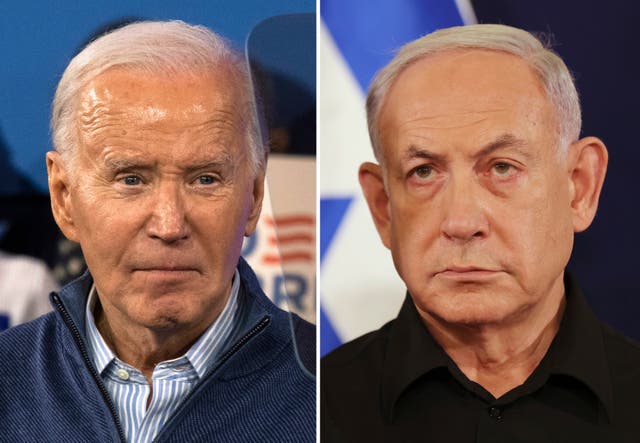Hamas has announced it has accepted an Egyptian-Qatari proposal for a ceasefire to halt the seven-month war with Israel in Gaza.
It came hours after Israel ordered about 100,000 Palestinians to begin evacuating the southern city of Rafah, signalling that a long-promised ground invasion could be imminent.
A source said Israeli officials are examining the proposal, but warned that it “is not the framework Israel proposed”.
In recent days, Egyptian and Hamas officials said the ceasefire would take place in stages during which Hamas would release hostages it is holding in exchange for Israeli troop pullbacks from Gaza.
It is not clear whether the deal would meet Hamas’s key demand of bringing about an end to the war and complete Israeli withdrawal.
Hamas said in a statement that its top leader, Ismail Haniyeh, had delivered the news in a phone call with Qatar’s prime minister and Egypt’s intelligence minister.
After the release of the statement, Palestinians erupted in cheers in the sprawling tent camps around Rafah, hoping the deal meant an Israeli attack had been averted.
Israel’s closest allies, including the US, have repeatedly said that Israel should not attack Rafah, and the looming operation has raised global alarm over the fate of around 1.4 million Palestinians sheltering there.
Aid agencies have warned that an offensive would worsen Gaza’s humanitarian catastrophe and bring a surge of more civilian deaths in an Israeli campaign that has killed 34,000 people and devastated the territory.
US President Joe Biden spoke on Monday with Israeli Prime Minister Benjamin Netanyahu and reiterated US concerns about an invasion of Rafah. He said a ceasefire is the best way to protect the lives of Israeli hostages held in Gaza, a National Security Council spokesperson said.

Hamas and Qatar said invading Rafah would derail efforts by international mediators to broker a ceasefire.
Days earlier, Hamas had been discussing a US-backed proposal that reportedly raised the possibility of an end to the war and a withdrawal of Israeli troops in return for the release of all hostages held by the group. Israeli officials have rejected that trade-off, vowing to continue their campaign until Hamas is destroyed.
Mr Netanyahu said on Monday that seizing Rafah, which Israel says is the last significant Hamas stronghold in Gaza, is vital to ensure the militants cannot rebuild their military capabilities and repeat the attack on Israel that triggered the war.
Lieutenant Colonel Nadav Shoshani, an army spokesman, said about 100,000 people were being ordered to move from parts of Rafah to a nearby Israel-declared humanitarian zone called Muwasi, a makeshift camp on the coast. He said Israel has expanded the size of the zone and that it included tents, food, water and field hospitals.
Around 450,000 displaced Palestinians are already sheltering in Muwasi. The UN agency for Palestinian refugees, known as UNRWA, said it has been providing them with aid but conditions are squalid, with few toilets or sanitation facilities in the largely rural area.
Israeli military leaflets were dropped with maps detailing a number of eastern neighbourhoods of Rafah to evacuate, warning that an attack was imminent and anyone who stays “puts themselves and their family members in danger”.
UNRWA will not evacuate from Rafah so it can continue to provide aid to those who stay behind, said Scott Anderson, the agency’s director in Gaza.
“We will provide aid to people wherever they choose to be,” he said.
The UN says an attack on Rafah could disrupt the distribution of aid keeping Palestinians alive across Gaza. The Rafah crossing into Egypt, a main entry point for aid to Gaza, lies in the evacuation zone. The crossing remained open on Monday after the Israeli order.
Jan Egeland, secretary-general of the Norwegian Refugee Council, condemned the “forced, unlawful” evacuation order and the idea that people should go to Muwasi.
“The area is already overstretched and devoid of vital services,” he said, adding that an Israeli assault could lead to “the deadliest phase of this war”.
Israel’s bombardment and ground offensives in Gaza have killed more than 34,700 Palestinians, around two-thirds of them children and women, according to Gaza health officials.
More than 80% of the population of 2.3 million have been driven from their homes, and hundreds of thousands in the north are on the brink of famine, according to the UN.




Why are you making commenting on The National only available to subscribers?
We know there are thousands of National readers who want to debate, argue and go back and forth in the comments section of our stories. We’ve got the most informed readers in Scotland, asking each other the big questions about the future of our country.
Unfortunately, though, these important debates are being spoiled by a vocal minority of trolls who aren’t really interested in the issues, try to derail the conversations, register under fake names, and post vile abuse.
So that’s why we’ve decided to make the ability to comment only available to our paying subscribers. That way, all the trolls who post abuse on our website will have to pay if they want to join the debate – and risk a permanent ban from the account that they subscribe with.
The conversation will go back to what it should be about – people who care passionately about the issues, but disagree constructively on what we should do about them. Let’s get that debate started!
Callum Baird, Editor of The National
Comments: Our rules
We want our comments to be a lively and valuable part of our community - a place where readers can debate and engage with the most important local issues. The ability to comment on our stories is a privilege, not a right, however, and that privilege may be withdrawn if it is abused or misused.
Please report any comments that break our rules.
Read the rules hereLast Updated:
Report this comment Cancel